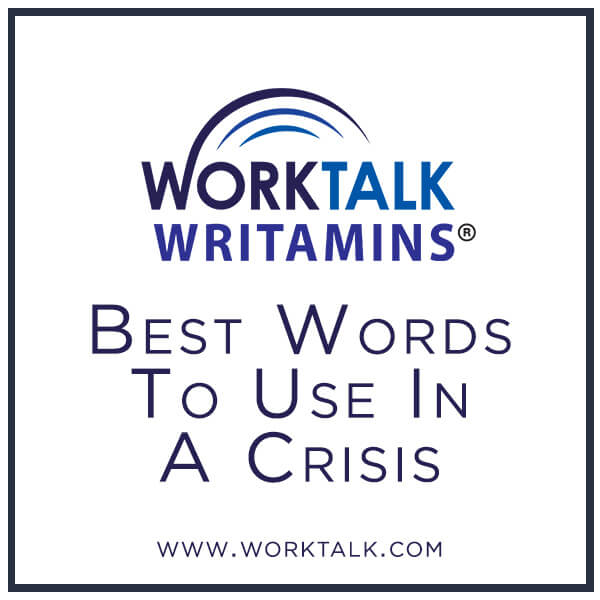[5-minute read]

Never use a long word when a short one will do.
— George Orwell
During World War 2, Winston Churchill was asked to deliver the commencement address at a British boys’ school. The staff was thrilled to have the Prime Minister addressing the students. After a long introduction, Churchill took the podium. He said, “Never give up!” and sat down. The headmaster, in consternation, asked him if he could elaborate. Churchill returned to the podium and said, “Never, never, never give up!” and sat down. Throughout the war, Churchill gave courage to his nation with his powerful yet simple language.
In a recent post from the Harvard Business Review, Professor Carmine Gallo notes that when leaders communicate during a crisis, using simple, clear language is essential. If readers’ minds are spinning with uncertainty and fear, long words do not penetrate the fog. Using short, familiar words is like hitting a bullseye with a swift, clean arrow rather than tackling the target and knocking it down. Nevertheless, a longer, more complex word may dull the impact of information that might otherwise be devastating.
Which is Better? Long or Short?
Writing is about making choices. Depending on your purpose, your reader, and your context, you may choose the forceful impact of the plain word or the woolly guise of the complex.
Longer words generally have Greek or Latin roots and are often littered with prefixes and suffixes. Shorter, more direct words tend to spring from the Anglo-Saxon/German word families. If you want to simplify, chop off the prefix and suffix and search for the root concept of the word. Then rephrase it simply. For example, consider the word incontestable. It is composed of three chunks:
| In | Contest | able |
| Not | Argue | able |
So if we take it apart, we see that incontestable means that something cannot be argued with. Compare these sentences:
Our view is incontestable.
You cannot argue with our view.
If you aim for a formal, hi-falutin’ tone, you might go with incontestable. Longer words are appropriate when you are trying to dull the impact of your message. For example, some COVID statistics refer to excess mortality in comparing death rates from 2019 to those in 2020. To me, it is somehow easier to swallow excess mortality than increased deaths. We all know what it means, but because the word does not immediately penetrate our consciousness, its impact is blunted.
Another reason to choose the longer word is that it may be the perfect word to say what you mean. If you want to be precise, then use the word that best suits your meaning. If you can’t find an Anglo-Saxon/German alternative, go with the long word. Your word choice needs to suit your situation.
However, if you want your reader to understand you quickly and clearly, short, familiar words are your friends.
When Short, Simple Words Are Better
Crisis: Think of the great wartime leaders of the 20th century: Churchill and Roosevelt. Both men were renowned for their plain, powerful English. We have nothing to fear but fear itself, said Roosevelt. Churchill’s speeches are legendary. In our day, the government leaders with the clearest messages bring the most clarity and comfort.
Warning: When you are warning someone, use the simplest possible language. For example, Stay home. Stop the spread. Save lives impelled millions of people to change their behavior radically. If leaders had said, In order to minimize contagion to the populace, we find it necessary to indicate to the populace that maintaining residency in their domicile would prevent the spread of the virus and have a salutary effect on public health, we’d all still be sitting in restaurants.
Praise: If a person has done a good job, tell them so loudly and clearly. You did a great job!, followed by details of the impact of the job well done, will boost morale much more than This task appears to have been completed in a satisfactory manner.
Uncertain Times Require Focused Language
When uncertainty abounds, language must be focused. Our words may sink deep into the reader’s heart. If we are describing something scary, like death or injury, we might choose to soften the blow of bad news by using more abstract words or even euphemisms. However, when we wish to comfort and inspire, short, familiar words contribute to the community.
In closing his Harvard Business Review article, Gallo writes, “Like a virus, words are infectious. They can instill fear and panic or facilitate understanding and calm. Above all, they can spark action. So choose them carefully.”
©2020 Elizabeth Danziger All rights reserved
Schedule an online consultation today! Communication woes drain the lifeblood from an organization. Connect me with your decision-makers and see how Worktalk can transform communication in your world. Contact me at lizd@worktalk.com or 310.396.8303. You can also book through www.calendly.com/worktalk.
~~~~~~~~~~~~~~~~~~~~~~~~~~~~~~~~~~~~~~~~~~~~~~~~~~~~~~~~~~~~~
About Worktalk
Worktalk’s training and coaching prepare teams to write clearly and confidently amid the pressures of constant communication. Our process equips them with the mindset and tactics to strengthen credibility, increase influence, and generate new possibilities.
To learn more about how Worktalk might make a difference in your organization, call Liz Danziger at 310.396.8303 or email lizd@worktalk.com.
